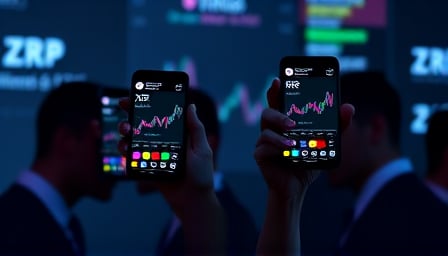XRP Army’s Impact on Ripple’s SEC Verdict: A Consolidated Analysis
The conclusion of Ripple Labs’ multi‑year litigation with the U.S. Securities and Exchange Commission (SEC) has been widely attributed to the coordinated efforts of the XRP Army—a community of holders and supporters who mobilized during the cryptocurrency’s most volatile periods. Multiple statements from crypto lawyer John De T — the attorney who represented XRP holders in the amicus brief—affirm that the collective activity of this group was a decisive factor in securing the partial victory achieved in July 2023 and ultimately in the dismissal of the case last month.
1. Legal Context and the July 2023 Ruling
In the 2020 SEC complaint, the regulator alleged that Ripple had sold XRP tokens as unregistered securities. The case reached a pivotal point in July 2023 when Judge Analisa Torres ruled that XRP is not, by itself, a security. This decision hinged on the judge’s assessment of the evidence presented by Ripple’s legal team and the amicus brief filed by De T. The brief included thousands of affidavits from self‑proclaimed XRP holders—many of whom identified as members of the XRP Army. De T has repeatedly stated that the judge explicitly cited community‑generated evidence in her judgment, underscoring the tangible influence of the army’s documentation.
2. Community‑Generated Affidavits as Legal Evidence
The XRP Army’s contribution materialized primarily through the submission of affidavits. These documents, signed by individual holders, detailed their ownership history, transaction patterns, and interpretations of XRP’s utility. By amassing a voluminous, decentralized corpus of testimony, the army furnished the court with a grassroots perspective that complemented Ripple’s formal legal arguments. The sheer scale and consistency of these affidavits were described by De T as a “decisive role” in shaping the court’s understanding of XRP’s functional characteristics.
3. Advocacy Beyond the Courtroom
While the legal filings were central, the XRP Army’s activism extended to social media, forums, and community outreach. The coordinated narrative promoted XRP’s status as a digital currency rather than a security, reinforcing the arguments presented in the amicus brief. This sustained advocacy helped maintain market confidence during periods of regulatory uncertainty and likely contributed to the asset’s resilience.
4. Market Implications
The closure of the SEC case has immediate and long‑term effects on XRP’s market dynamics. With the ambiguity surrounding its security status largely removed, institutional interest is poised to increase. The 52‑week high of $0.190045 reached in January 2025 reflects the asset’s upside potential, while the recent close of $0.0200352 on September 2, 2025 indicates a continued recovery trajectory. The XRP Army’s role in securing legal clarity positions the token to capitalize on forthcoming opportunities, including expanded liquidity options and potential listings on regulated exchanges.
5. Forward‑Looking Perspective
From an insider standpoint, the ripple effect of the army’s participation is likely to extend beyond the immediate outcome. The precedent of community‑generated evidence influencing judicial decisions could encourage similar mobilizations in other jurisdictional disputes. For XRP, the confluence of a clear legal framework and robust community support lays the groundwork for a more stable and predictable investment profile. Analysts anticipate that as regulatory frameworks evolve, the asset will benefit from both the de‑risked status affirmed by the court and the sustained advocacy that has proven instrumental in shaping that outcome.
In summary, the XRP Army’s strategic mobilization—through affidavits, public advocacy, and community cohesion—played an instrumental role in Ripple’s landmark victory against the SEC. This case not only resolves a pivotal legal question but also exemplifies the power of decentralized stakeholder engagement in influencing regulatory and judicial processes.
